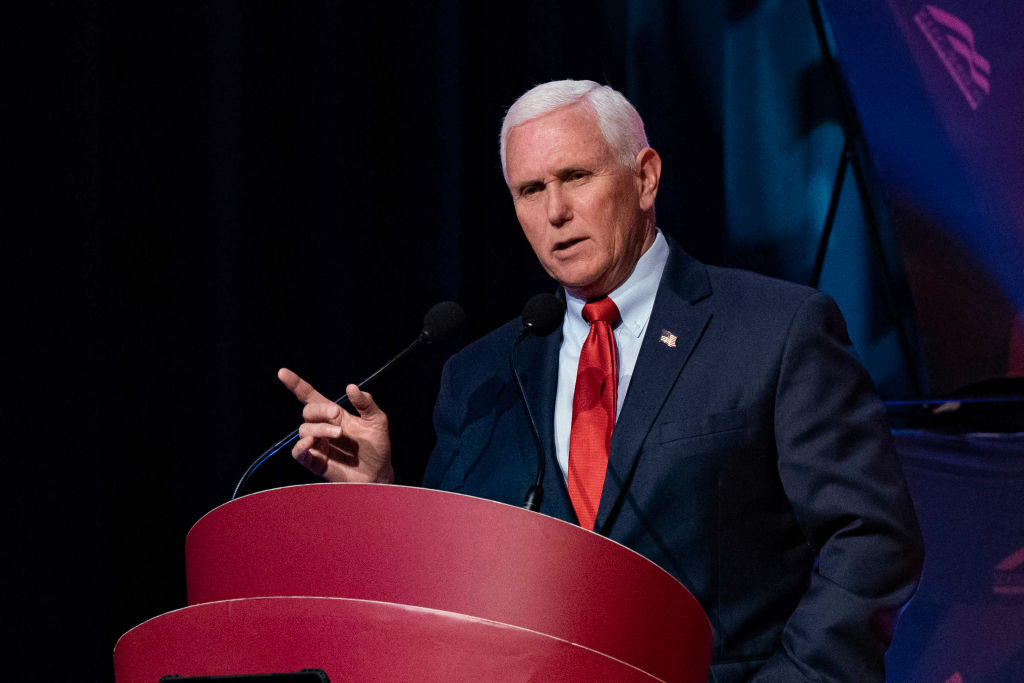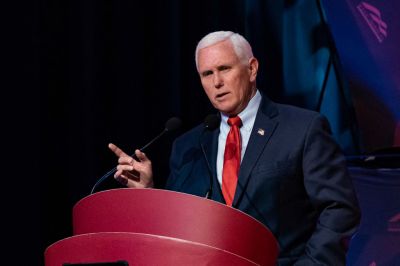In front of a group of more than a dozen high-dollar Republican donors and fundraisers gathered in Dallas earlier this month, former Vice President Mike Pence made a bold pitch: As a full-spectrum conservative with a proven record of accomplishment at all levels of public service, he was best positioned to win both the Republican nomination in 2024 and the general election.
As Pence prepares to launch his White House bid in the coming weeks, his allies want to amplify that message and cast him as a movement conservative more in the mold of Ronald Reagan than of Donald Trump. A new super PAC, called Committed to America, will support Pence through both a messaging campaign and what its organizers claim will be a robust ground game in early primary states.
“This campaign is going to reintroduce Mike Pence to the country as his own man, not as vice president, but as a true economic, social, and national security conservative—a Reagan conservative,” said Scott Reed, a veteran Republican strategist who helped start Committed to America.
Reed, who served as Bob Dole’s campaign manager in 1996 and for several years was the political director for the U.S. Chamber of Commerce, will co-chair the PAC alongside former Rep. Jeb Hensarling, a close friend of Pence’s from their shared time in the House of Representatives. Among the initial staff hires are Executive Director Bobby Saparow and Communications Director Mike Ricci.
The group plans to focus its initial efforts on organizing in Iowa, the site of the first nominating contest and home to a socially conservative Republican electorate. According to people familiar with the plans, Committed to America will get involved in the other early states, including New Hampshire and South Carolina, but efforts will be primarily based in the Hawkeye State.
“Iowa is the first and most important defining event for our effort,” said Reed. “We’re going to organize Iowa, all 99 counties, like we’re running him for county sheriff.”
That’s the task at hand for Saparow, who most recently served as Brian Kemp’s campaign manager in the Georgia governor’s successful 2022 reelection campaign. Kemp’s paid voter-contact effort there helped boost him to a big win in a competitive primary race as well as in the general election against Democrat Stacey Abrams.
“You will see that what we built out with Gov. Kemp is going to be taken to the national stage. So we will also be doing a very extensive paid voter contact program through Committed to America,” Saparow said. “We have all the confidence in the world that the results that we were able to garner for Gov. Kemp we can duplicate for the vice president.”
While federal campaigns have strict fundraising limits, super PACs are allowed to take unlimited contributions, allowing them to fund some of the more expensive aspects of modern presidential races. That includes labor- and data-intensive voter outreach, which officials at Never Back Down, a super PAC supporting Florida Gov. Ron DeSantis, have said they also expected to perform in place of the campaign itself. Federal election rules limit coordination between super PACs and the candidates they support.
On the messaging itself, Committed to America will be trying to reintroduce Pence to Republican primary voters as a trustworthy conservative leader with a political profile apart from and with wider appeal than Trump.
“People know Mike Pence,” said Reed. “They just don’t know him well.”
But it’s unclear how the pro-Pence super PAC will be able to compete in Iowa or the other early primary states against the well-funded efforts to support DeSantis and Trump. The group and those close to it declined to share any information about its fundraising so far. In total, Never Back Down and other pro-DeSantis committees have an estimated $110 million to spend, while Trump’s super PAC, MAGA Inc., ended last year with $55 million in the bank.
And despite Pence’s social conservative credentials, his position with Iowa Republican voters leaves much to be desired. In the Des Moines Register’s Iowa poll this spring, 26 percent of self-identified Republicans said they had an unfavorable view of Pence, higher than Trump (18 percent), DeSantis (6 percent) or Nikki Haley (8 percent). And some with experience in Iowa GOP politics say it will be hard for the former vice president to break out of the pack.
“I’m not sure the path for Pence is there right now,” said David Kochel, a veteran Iowa Republican strategist. “I do see signals that some of the old guard social conservative crowd is waiting to see what DeSantis does.”
And as voters begin to see candidates and potential candidates up close, the mood toward Pence appears vaguely positive but somewhat skeptical.
“I love Mike Pence as a man and as a person but I don’t think he’s electable,” said Mark Hulst, 70, a physical therapist and likely caucusgoer who echoed others among the approximately 700 people who packed a classic car museum to hear from DeSantis last weekend. “Pence is too nice a guy. We need a man who can be really tough in the White House in dealing with the swamp that’s there.”
Others were more open to a Pence 2024 campaign, including a husband and wife in their early 40s, Sean and Samantha Hallowell, who prefer almost any Republican over Trump. They voted for the former president twice but say the former vice president had a lot to do with that. “I like Pence, he was actually the validator for us to vote for Trump in ‘16,” Sean Hallowell said. “If it hadn’t been for him picking Pence, we probably would never have considered it.”
If there is an opening for Pence in Iowa, it would likely require DeSantis’ recent slide in the polls to continue. One former Trump administration official who worked in proximity to both Pence and the former president said Pence would be wise to take advantage of DeSantis’ struggles by presenting himself as the most viable counter to the 45th president.
“If you want Trump/Pence policies without Trump, there’s one name left,” this former Trump administration official said. “I think if he were strategic right now, he’d pick off donors and members of Congress and opinion leaders who thought the alternative to Trump was DeSantis.”
With reporting from David M. Drucker in Sioux Center, Iowa.







Please note that we at The Dispatch hold ourselves, our work, and our commenters to a higher standard than other places on the internet. We welcome comments that foster genuine debate or discussion—including comments critical of us or our work—but responses that include ad hominem attacks on fellow Dispatch members or are intended to stoke fear and anger may be moderated.
With your membership, you only have the ability to comment on The Morning Dispatch articles. Consider upgrading to join the conversation everywhere.